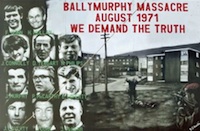
A British minister has indicated that an investigation into the killing of eleven people in west Belfast by the British Army in 1971 is to be refused.
Six-County Minister Hugo Swire said the Tory/Lib-Dem government believed the police Historical Enquiries Team (HET), which is examining the Ballymurphy massacre, was capable of dealing with any investigation.
Last year the British government sought to rule out any further inquiries into state killings or collusion as part of the controversial ‘reconciliation without truth’ proposals of the Eames-Bradley commission, which instead suggested cash payments to victims’ families.
However, a group representing the families of the people killed in the west Belfast shootings has continued to campaign for a full international independent inquiry to be held.
It has furiously criticised the police investigation, saying it did not want the state investigating the state.
But Mr Swire insisted the case had to be considered in the context of one of the “bloodiest years” of the conflict.
He said: “We listened carefully to the families’ calls for an international independent investigation, a recognition of the innocence of the loved ones and an apology.
“We did, of course, note the ongoing investigation into the case being carried out by the HET. The Government strongly supports the work of the HET.”
He added that the Government would accept responsibility for the wrongdoings of the state, but focusing solely on the actions of the state was not appropriate.
The SDLP’S Mark Durkan appeared close to tears as he recounted the details of the Ballymurphy Massacre.
During a debate he secured on the deaths, he became visibly upset when telling MPs how Catholic priest Father Hugh Mullan was shot down when he went to the aid of another victim.
The 11 men and women, including a mother-of-eight Joan Connolly, were killed by Paratroopers who then falsely claimed that they had been shot at by republicans.
He paid tribute to the dedication of the victims’ families.
He said: “It won’t be the last debate on the events in Ballymurphy in August 1971. Not least, given the questions people will have to the minister’s response to the debate.
“I was glad that a number of other MPs attended to recognise the case being brought forward by the Ballymurphy families and to acknowledge the enormity of the events in Ballymurphy in a concentrated operation by paratroopers over three terrible days.”
Representatives of the Ballymurphy Massacre victims’ families are currently in the United States to lobby senior US Politicians including Senator Chris Dodds and Rep Richard Neal.
At a series of meetings in New York and Washington DC they also met with representatives of Irish American organisations who pledged their support and vowed to raise awareness of the case in the US.
Sinn Fein President Gerry Adams MP said: “US politicians and Irish American organisations have been actively involved in many justice campaigns over the years, including cases of collusion, Bloody Sunday, Rosemary Nelson, the issue of contentious marches and state violence. They have also been hugely supportive of the peace process.
“I am confident that all those the Ballymurphy families meet will quickly accept the merits of their demands and support them. The evidence is overwhelming.”
HIERARCHY OF VICTIMS
Meanwhile, a proposed attempt by the DUP to change the definition of a victim to exclude republicans is to be opposed at the Belfast Assembly on Monday.
“We believe that this attempt to run roughshod over the rights of some victims is nothing short of an insult, not just to the victims but especially to their survivors who cherish their memories,” a Sinn Fein statement said.
“Sinn Fein will not stand by and allow the DUP or anyone else to be selective about or redefine who was a victim of the conflict from which we have emerged.”
![[Irish Republican News]](https://republican-news.org/graphics/title_gifs/rn.gif)
![[Irish Republican News]](https://republican-news.org/graphics/title_gifs/harp.gif)

